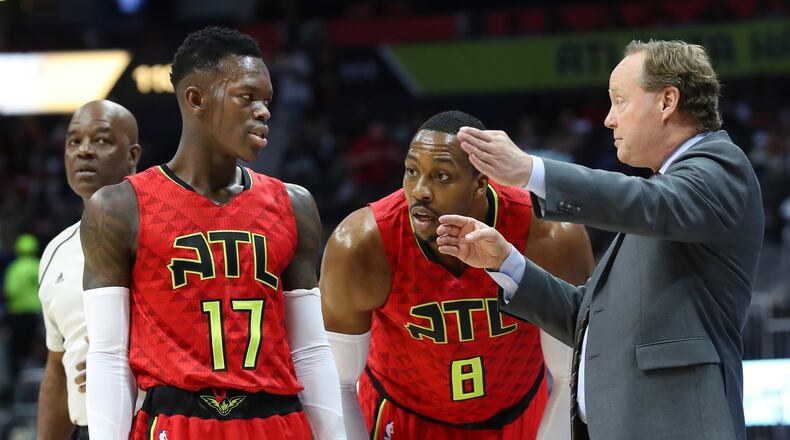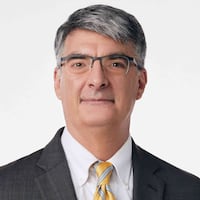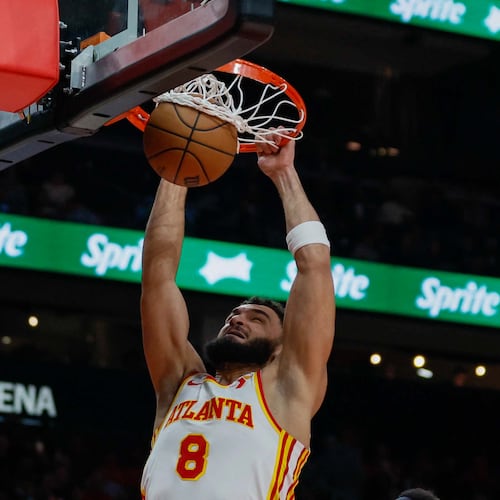There were growing pains.
Dennis Schroder played a significant role in the Hawks’ up-and-down season. The young point guard concluded his first season as a starter with a first-round exit from the playoffs last week. The Hawks won 43 regular-season games and continued their postseason run as a No. 5 seed with Schroder at the helm. Yet, there were instances of immaturity and the team struggled with an inconsistent offense much of the season.
“I think it was a good season,” Schroder said during his exit interview last week. “My first year, 23 (years old), we made the playoffs. I think it was pretty good. Next season, we’ve got to keep it consistent, not up and down like we had this year, and we’ll be fine.”
Schroder was the Hawks’ second-leading scorer at 17.9 points per game. He led the team with 6.3 assists, but also 3.3 turnovers per game. He was durable as he appeared in 79 regular-season games, missing three games with a foot sprain, rest and a team suspension.
In a career-high 31.5 minutes per game, Schroder also had his best regular season statistically, in points, assists, steals, rebounds, field-goal percentage and free-throw percentage.
The suspension was one of several public incidents involving Schroder. He did not return in time from an All-Star break trip to Germany because he did not bring his visa. He didn’t start the very next game after he was late for the team bus. There was also an on-court squabble with Dwight Howard that drew attention.
Schroder was a strong presence for the Hawks in the playoffs. He led the team by averaging 24.7 points and 7.7 assists in the six-game series. More stark, was the fact that Schroder committed only 10 turnovers.
“You look at the positives,” Paul Millsap said. “You have a young guy who came in his first year as a starter and got his team to the first round of the playoffs. We look at the positives and say he can get better because he wants to get better.”
Schroder said he has several offseason goals. One will mean another summer trip to his native Germany for the European Championships.
“I want to get stronger, for sure,” Schroder said. “Work on my jumper still. Just try to get better every day. I’m going to be in Germany a lot, playing in the European Championship probably as well. As a leader for that team, I want to get better every day. Try to be an idol for all the German people. My German teammates are looking up to me. I’ll try to do a good job there and come back and start a new season here.”
The European Championships are Aug. 31-Sept. 7 and will be played in host countries Finland, Israel, Romania and Turkey. Germany will be in Group B with Ukraine, Israel, Lithuania and Italy.
Schroder accepts part of the blame for the Hawks’ struggles on offense as they tried to incorporate Howard into the system. Howard came with a different skill set, one of a traditional center, than Schroder worked with in his first three NBA seasons.
“We have to improve a lot more for us to get even further,” Schroder said. “On the defensive end, he has to show more effort, I have to show more effort. On the offensive end, the same thing. I don’t know what it is, after practice maybe, stay here for 20 more minutes and figure out what we have to do in the game. We, for sure, have to better.
“It’s different when Dwight is on the floor. It was different with Al Horford was on the floor. We have to switch up the system a little bit. We have to get reps. We have to be together for a while. I think we’ll be fine.”
Millsap was often a sounding board for Schroder as he navigated his first season as a starter and saw a more mature player by the end of the season. The key to Schroder’s on-court success is the aggressive nature and speed of the point guard.
“Just continue to attack,” Millsap said of Schroder. “At times when he struggled with his shot, he stopped attacking. I think his mentality has changed. When he wasn’t making shots, he continued to attack and get other people involved. His maturity level has grown throughout the course of the year.”
About the Author
Keep Reading
The Latest
Featured


